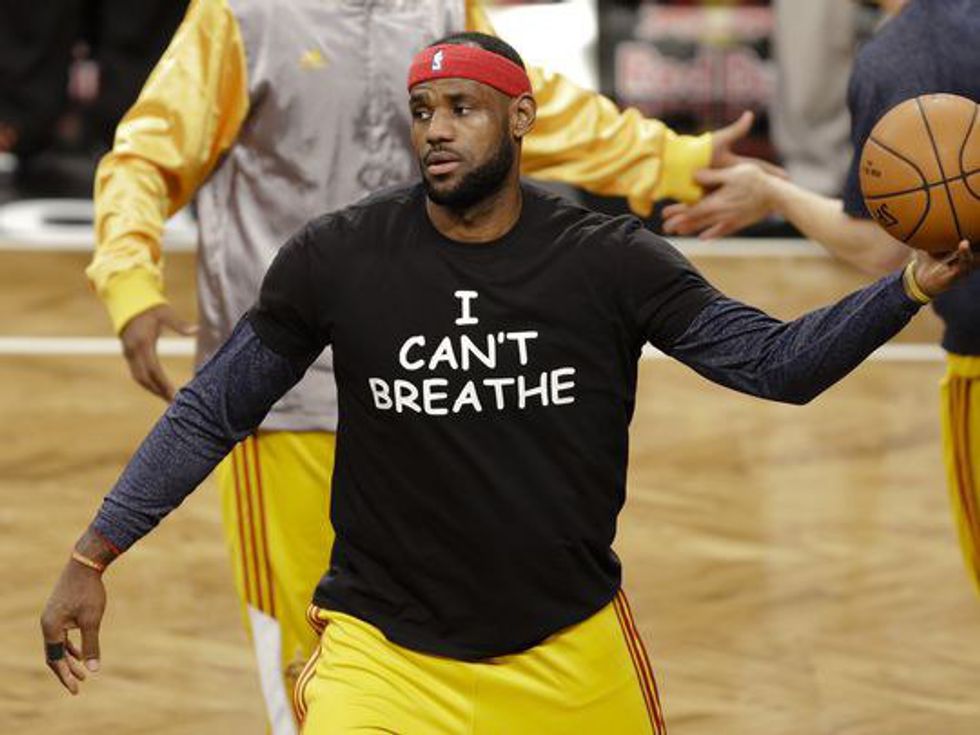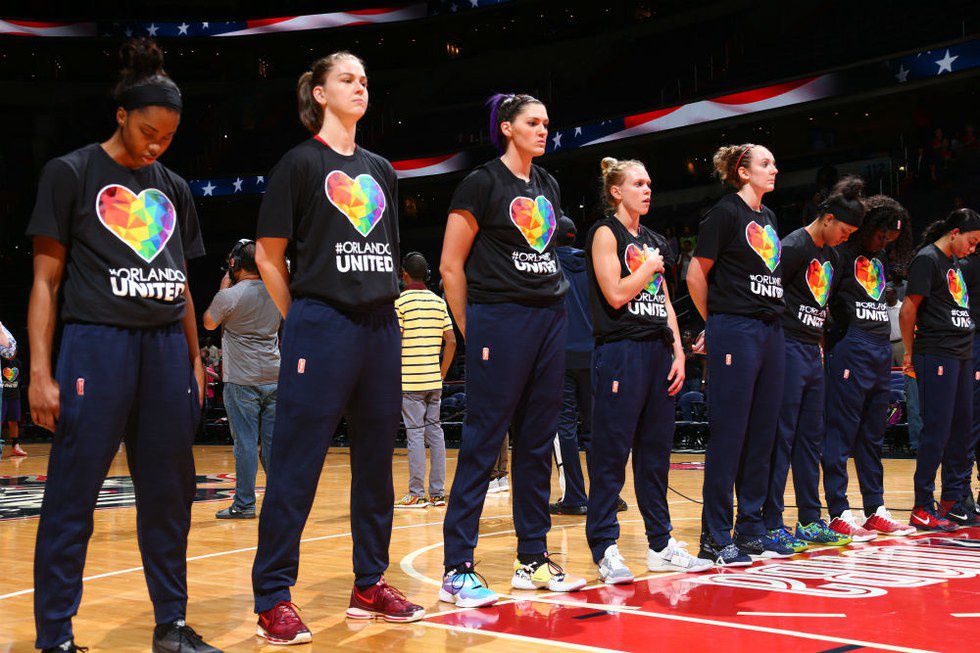Last week the WNBA teams Indiana Fever, New York Liberty and Phoenix Mercury were fined five thousand dollars per team and five hundred dollars per player for "violating the league's uniform policy," when they warmed up in black shirts honoring the deaths of Alton Sterling and Philando Castile along with sporting the Black Lives Matter hashtag. WNBA President, Lisa Borders, applauded these women for taking a stance on a social issue that directly affects 69 percent of the league's players.
Borders wants "the players to know that we have supported them in the past, support them today and will continue to support them in the future ... We're not trying to stop them from expressing themselves". However, the league fined the players three hundred dollars more than the normal fine for a uniform violation.
Naturally, the players are upset. Ivory Latta, who's a nine-year veteran of the league, criticized the punishment saying, "We need change and we have a platform to speak... Don't tell us we have a platform and then you penalize us for our platform for speaking and showing our actions."
The message from the players is that their opportunity to speak is unique and yields a much greater chance for publicity and should be taken advantage of it. Which is true.
The Washington Mystics are actually refusing to take questions about basketball entirely, making the focus entirely on the protest, whether the media wants that or not.
However, as the league takes its two-week break for the Olympics in Rio, there is a strong desire for these protests to die down in intensity to allow for constructive conversations about how the league further handles these types of scenarios.
On the other side of the sport, the NBA has just announced the change of location for the NBA All-Star game in this upcoming season. Charlotte, North Carolina has lost out on the chance to host the event due to its recent legislation refusing to legally protect LGBT people from discrimination.
The NBA has often been quick and decisive when dealing with certain social issues, like gun violence, Donald Sterling and police brutality. Even some of its marquee players have spoken out, with their own forms of silent protests, like LeBron James here:
With this recent decision the commissioner, Adam Silver, made a stance on how the league associates itself with the LGBT community, something no other major sports league has been willing to do.
And while the news is good for those in support of further legislation protecting groups of people from discrimination, it still came as a surprise for some players. Indiana Pacers forward, Paul George, disagrees but understands the decision stating, "it's a shame that it's possible that we'd take [the event] away from them."
However, despite the few disapproving comments, the general feeling is of disappointment that the city was put in a position to allow this to happen.
So what happens when two sides of the same sport show such a gaping difference of actions, especially when the two leagues work together so closely? Well, for one, it allows quite a bit of space for interpretation. And it also allows for hypocrisy to show. When LeBron, Derrick Rose and other NBA players alike wore the "I Can't Breathe" shirts back in 2014, Adam Silver gave only caution and did not take one side over the other.
This is a far less aggressive stance than the one Silver is making this weekend with the relocation. However, this falls under the "on-court attire" issue, which Silver would prefer players keep their opinions out of.
But, again, hypocrisy pops up in the form of this on-court demonstration. The Washington Mystics showed their support for the victims of the Orlando Nightclub shooting by wearing specialized t-shirts for their warm-ups and opening ceremonies. The WNBA has a page dedicated to the moment, where you can actually bid on the shirts.
And if the WNBA continues to defend its decision for fining these players and teams for violating a uniform rule, they should consider the implications of allowing attire like this:
While the shirts are Adidas-branded, something that is not clear in this picture, it is the message that counts, a point that WNBA operations director, Terri Jackson, makes: "They want to raise visibility and keep the conversation going. They don't want this to die out."
The NBA's recent decision may be the silver-lining in this harsh reaction by the WNBA, as it can not only "keep the conversation going," but also show the underlying issues within the league, making this much more than a trending topic.
***UPDATE***
This weekend, the WNBA has reviewed the complaints from fans players and other outraged individuals alike and decided to not fine the players and teams involved in the Black Lives Matter protests. Though, it was more-so rescinding the fines than anything, as the league was clear as to their intentions of the fines and their willingness to uphold the rules and the refusal to attempt to re-negotiate them.
While is a good step forward for the league, it is not a victory. But players know now that their voices matter, or so it seems. As the days pass since Lisa Borders’ newest decision on the matter, and the league takes its Olympic break, it will be important to note how both the media pushes this mishandling of a situation away from the minds of sports fans and social justice activists. If this becomes the case, we may see the WNBA in a similar situation in the future.










 The minimum wage is not a living wage.
StableDiffusion
The minimum wage is not a living wage.
StableDiffusion
 influential nations
StableDiffusion
influential nations
StableDiffusion












